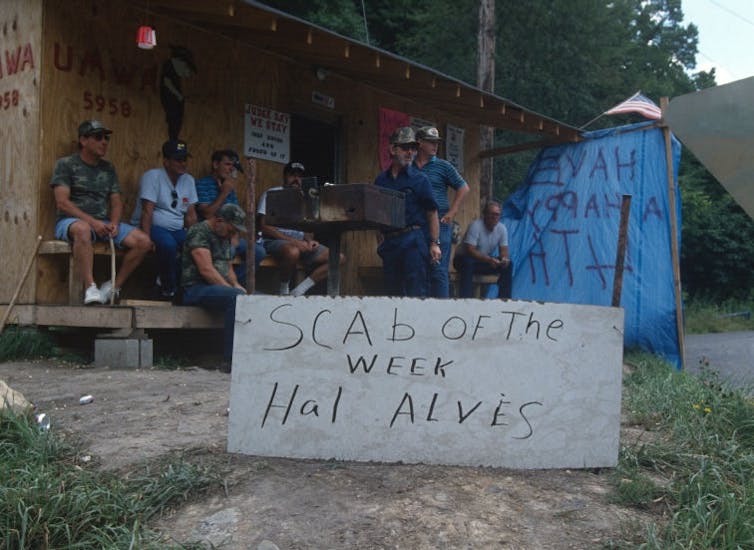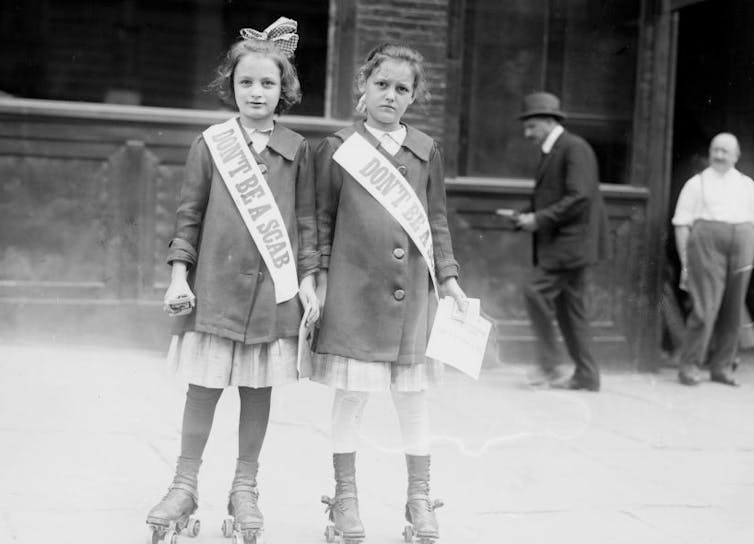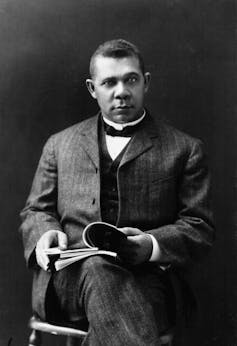Over its prolonged historic previous, the American labor movement has displayed a remarkably rich vocabulary for shaming these deemed traitors to its set off.
Some insults, much like “blackleg,” are largely forgotten proper now. Others, much like “stool pigeon,” now sound further similar to the dated banter of film noir. A few phrases nonetheless present attention-grabbing dwelling home windows into the earlier: “Fink,” as an example, was used to disparage staff who educated for administration; it seems to have been derived from “Pinkerton,” the personal detective firm notorious for strikebreaking all through mass actions like the Good Railroad Strike of 1877.
No phrase, however, has burned American staff further persistently, or further wickedly, than “scab.”
Any labor movement proper now will inevitably end in someone getting known as a scab, an insult used to smear people who cross picket traces, break up strikes or refuse to hitch a union. No person is previous the attain of this accusation: United Auto Workers President Shawn Fain known as former president Donald Trump a “scab” in August 2024, after Trump instructed to Elon Musk that putting staff at one amongst Musk’s companies should be illegally fired.
Whereas engaged on my e guide “Sellouts! The Story of an American Insult,” I discovered that labor’s scabs had been among the many many first People acknowledged as sellouts for betraying their very personal.
Reinforcing class solidarity
The utilization of scab as an insult really dates to Medieval Europe. Once more then, scabbed or diseased pores and pores and skin was extensively seen as a result of the sign of a corrupt or immoral character. So, English writers started using “scab” as slang for a scoundrel.
Inside the nineteenth century, American staff started using the phrase to assault pals who refused to hitch a union or labored when others had been putting. By the Eighties, periodicals, union pamphlets and books all repeatedly used the epithet to chastise any staff or labor leaders who cooperated with bosses. Names of scabs had been usually printed in native papers.
Scab likely caught on on account of it directed visceral disgust at anyone who put self-interest above class solidarity.

Andrew Lichtenstein/Corbis by the use of Getty Pictures
A lot of labor’s scabs clearly deserved the label. All through a strike of Boston railroad staff in 1887for example, the union bombarded its chairman with cries of “traitor” and “scab” and “selling out,” on account of he gave in to agency requires prematurely, just because the union’s funds had been moreover mysteriously depleted.
Primarily probably the most extremely efficient expression of this shame comes from the pen of Jack London. Biggest remembered proper now for journey tales much like “White Fang,” London was moreover a socialist. His widespread 1915 missive “Ode to a Scab” captures the venomous contempt many have felt about people who betray their fellow staff:
“After God had accomplished the rattlesnake, the toad, and the vampire, He had some horrible substance left with which He made a scab… a two-legged animal with a corkscrew soul… The place others have hearts, he carries a tumor of rotten guidelines… No man has a correct to scab as long as there is a pool of water deep adequate to drown his physique in.”
In 1904, however, London had written an prolonged and fewer well-known essay, “The Scab.” Instead of shaming scabs, this essay explains the conditions that drive some staff to betray their very personal.
“The capitalist and labor groups,” London writes, “are locked collectively in a decided battle,” with capital making an attempt to verify earnings and labor making an attempt to verify a basic lifestyle. A scab, he explains, “takes from [his peers’] meals and shelter” by working once they will not. “He does not scab on account of he must scab,” London insists, nevertheless on account of he “cannot get work on the equivalent phrases.”
Fairly than cope with scabs as vampire-like traitors, London asks his readers to see scabbing as an moral transgression pushed by opponents. It is tempting to consider society as “divided into the two classes of the scabs and the non-scabs,” London concludes, nevertheless in capitalism’s “social jungle, everyone seems to be preying upon everybody else.”
Pushed to scab
London’s phrases ring with a harsh reality, and we’re capable of illustrate his stage by wanting on the discomforting standing of Black strikebreakers in American labor historic previous.
All through their heyday from the Eighties by the use of the Nineteen Thirties, major labor organizations such as a result of the Knights of Labor and American Federation of Labor did embody some Black staff and at events preached inclusion. These comparable groupshowever, moreover tolerated openly racist conduct by native branches.

PhotoQuest/Getty Pictures
Historian Philip S. Foner tells the story of Robert Rhodesa union bricklayer in Indiana whose “white union brothers refused to work with him.” The Bricklayers and Masons Worldwide Union of America did have an amazing of US$100 for such discriminatory practices, nevertheless Rhodes was stymied in efforts to get any money, and his racist co-workers punished him for making an attempt. He ended up being accused of “scabbing” by the union, and, in a brutal irony, fined. Rhodes quit and adjusted his career.
Civil rights activist WEB Du Bois as quickly as well-known that among the many many major working-class trades in America solely longshoremen and miners welcomed Black staff. In most fields, they wanted to aim to be a part of unions that had been usually implicitly – if not explicitly – segregated.
To go looking out work as masons, carpenters, coopers – or each different skilled trades dominated by unions that can usually discriminate based totally on race – Black laborers usually wanted to work beneath conditions that others would not tolerate: offering their corporations exterior the union, or taking over work the union had carried out whereas its members had been putting.
Briefly, they wanted to scab.
Class and race collide
It shouldn’t be exhausting to see the competing moral claims proper right here. Black staff who had struggled with racial discrimination claimed an equal correct to work, even when this meant disrupting a strike. Unions observed this as a violation of working-class solidarity, while they missed discrimination inside their ranks.
Managers and corporations, within the meantime, exploited this racial friction to weaken the labor movement. With tensions extreme, brawls usually broke out between Black strikebreakers and white strikers. An account of the 1904 Chicago miners’ strike well-known, “some one throughout the crowd yelled ‘scab,’ and instantly a rush was made for the negroes,” who fought once more the mob with knives and pistols sooner than metropolis police intervened.
As this ugly pattern repeated itself, a stigma began to cling to Black staff. White laborers and their representatives, along with American Federation of Labor founder Samuel Gompers, usually known as Black of us a “scab race.”

Widespread Historic previous Archive/Getty Pictures
If truth be told, Black staff had been merely a small share of strikebreakers. Most often, strikebreakers had been white immigrants, who, like their Black counterparts, may face discrimination by unions. Black People moreover had an prolonged historic previous of labor activism, struggling for union membership, improved working conditions and better wages in cities much like New Orleans and Birmingham.
In his 1913 essay “The Negro and the Labor Unions,” educator Booker T. Washington urged unions to complete their discriminatory practices, which pressured Black People into turning into “a race of strike-breakers.” Nonetheless, this racial stigma endured. Horrendous racial violence throughout the “Crimson Summer time season” of 1919 adopted shut on the heels of the Good Metallic Strikeall through which nonunion Black staff had been known as in to take care of steel manufacturing buzzing alongside.
Stopping fissures amongst staff
Whereas phrases like “scab” and “sellout” have usually been used to bolster labor unity, these comparable phrases have moreover worsened divisions all through the movement.
It’s too reductive, then, to simply shame scabs as sellouts. It’s vital to know why of us could also be motivated to local weather scorn, rejection and even violence from their pals – and to take steps in the direction of eradicating that motive.
In 2024, Canada’s Parliament handed landmark “anti-scab” legal guidelineswhich prohibits 20,000 employers from bringing in various staff all through a strike.
This laws will not solely strain companies to take heed to their staff’ needs all through a time of catastrophe, it ought to moreover create fewer divisions all through the labor movement – and fewer options for any worker to develop right into a scab.
